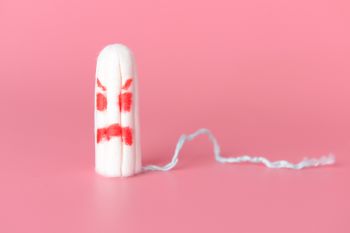Toxic Shock Syndrome (TSS) aka 'tampon disease'
 Unfortunately, from time to time we read that there are more victims of the "tampon disease". The tricky part is that a "link" to TSS is often not very easy to make, so it is very important to read these golden rules carefully so that if you are faced with this, you will receive the correct treatment (antibiotics).
Unfortunately, from time to time we read that there are more victims of the "tampon disease". The tricky part is that a "link" to TSS is often not very easy to make, so it is very important to read these golden rules carefully so that if you are faced with this, you will receive the correct treatment (antibiotics).
How is it created?
The major causative agents are two bacteria, namely the "staphylococcal" and "streptococcal" bacterium. The presence of these bacteria is not suspect in itself, as they are naturally present in/on our skin, nose and mouth (mucous membranes), and usually do not pose any risk. However, they can penetrate deeper into the body, causing them to release toxins or toxins that are capable of (severely) damaging organs and tissue.
TSS or tampon disease, what is the correct name?
It is popularly called "tampon disease", however the original name for this is Toxic Shock Syndrome (TSS). The reason it has become tampon disease is because when a woman wears a tampon for too long, there is a risk of poisoning and thus toxins can enter the bloodstream. Not only can the tampon be identified as a possible culprit, but wounds and damage to the mucous membrane can also contribute to toxins entering the bloodstream.
What do you notice?
The annoying thing is that the symptoms are very similar to flu-like symptoms, such as headache, sore throat, muscle pain, (high) fever, sometimes rash over the body, diarrhea, dizziness and fainting, eye discolouration (red) and breathing problems. If you have several of these symptoms at the same time, it is still wise to consult a doctor. If you also have your period, also state this emphatically, so that if necessary good treatment can take place.
Can you cure it?
Left untreated, it is an infection that can get worse very quickly, with a fatal outcome. Within a few days, organs can be affected or stop working (Multi Organ Failure). If you are there in time, it can be treated well with antibiotics. People often opt for hospitalization to administer the antibiotics via an IV. In addition, the infection values can be well monitored in the blood.
Can you prevent it?
A golden rule is to ensure that your hands are clean when inserting and removing the tampon, sponge or menstrual cup. Take a well-fitting tampon that matches the strength of your period, so if you have a light flow don't use a super tampon and above all, don't leave it on for too long; up to 8 hours at the longest, preferably even shorter! But also be careful with wounds, etc. Good hygiene is very important! Wash and/or disinfect hands.
And sanitary towels?
Sanitary towels are medically safer, but it is also important to know that TSS is very rare in the Netherlands. The registered cases are on average between 10 and 20 people per year. To get TSS you have to be a carrier of the bacteria that actually causes TSS. In concrete terms, that means that if you are not a carrier, you cannot get the disease. While if you are a carrier and change yourself on time, you still have no guarantee that you will not get the disease. Therefore, when it is not necessary to use tampons, try using sanitary towels. And if you really want or can only use tampons, change in time and preferably use sanitary towels at night.

Mona Liza Verseijden
sexpower.online
Datum: 26-01-'20
Terug naar overzicht
